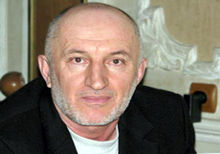Akhmednabi Akhmednabiyev was a Russian journalist and the deputy editor of the independent news outlet Novoye Delo (translated as « New Business »). Akhmednabiyev mostly covered stories regarding violations of human rights and paid particular interest to cases of alleged torture and abduction by the police. Additionally, he wrote about local Dagestan politics and according to Akhmednabiyev’s colleagues, his most recent stories focused on the leader of his native Akhvakhsky district, whom he harshly criticized.
On the 9th of July, 2013 at 7 a.m, Akhmednabiyev was sitting in his vehicle outside his house in the Semender suburb of Makhachkala, Dagestan, Russia when shots were fired at him. He was killed instantaneously at the age of 54 and was the 17th journalist to be murdered in Dagestan since 1993. Prior to his death, his name was added to a hit list for being critical of local law enforcement, speaking out on human rights and abuse, and defending Muslims. The list included the names of eight other journalists, one of whom was also shot to death in Dagestan in 2011. Those who wrote the list demanded revenge for the deaths of Russian police officers who were thought to have been killed by religious extremists. Akhmednabiyev was mistaken as a religious fundamentalist since he often defended Dagestan’s Muslim population.
This was not the first time Akhmednabiyev was targeted, however. He survived a previous attempt on his life after assailants fired guns at him as they drove past his home on January 11, 2013. As opposed to classifying the incident as an assassination attempt, local prosecutor’s classified it as a property damage case. However, after the July 9th murder, the case was re-evaluated and properly classified as a murder investigation.
On the day of Akhmednabiyev’s death, more than 170 Russian journalists carried his body through the streets of Makhachkala. Each journalist wore a sign that read, « Who will be next? » in response to Russia’s need to provide protection for threatened journalists and to classify the crimes against them correctly. His death is one of the latest examples of the dangers Russian journalists face when speaking out on human rights. As a result, journalists will now have to self-censor their work more closely. Numerous murders of Russian journalists remain unsolved and according to the Organization for Security and Cooperation in Europe (OSCE), it has a negative effect on the media community.
Publications, like Akhmednabiyev’s « Novoye Delo, » are being threatened by Russian law enforcement with lawsuits and there have been numerous attempts to shut them down. Dagestan is now thought of as the most dangerous place in Russia for a journalist to operate. Russia it self is the ninth most dangerous country for journalists to work, with a reported 340 journalists killed since 1990. Only 20 percent of those cases have been investigated.
Dunja Mijatović, a representative of Freedom of the Media for the OSCE, condemned the murder of Akhmednabi Akhmednabiyev on July 9, 2013. She stated that his death is a reminder that Russia needs to do more to ensure and guarantee the safety of journalists. Ambassador Ian Kelly, the United States OSCE representative addressed the Permanent Council in Vienna on July 11, 2013, noting that the United States strongly condemns the assassination of Akhmednabi Akhmednabiyev. Both Mijatović and Kelly echoed praise for a statement made by the Investigative Committee of the Russian Federation, which stated that the investigation of Akhmednabiyev’s murder would be handled with the highest priority.
